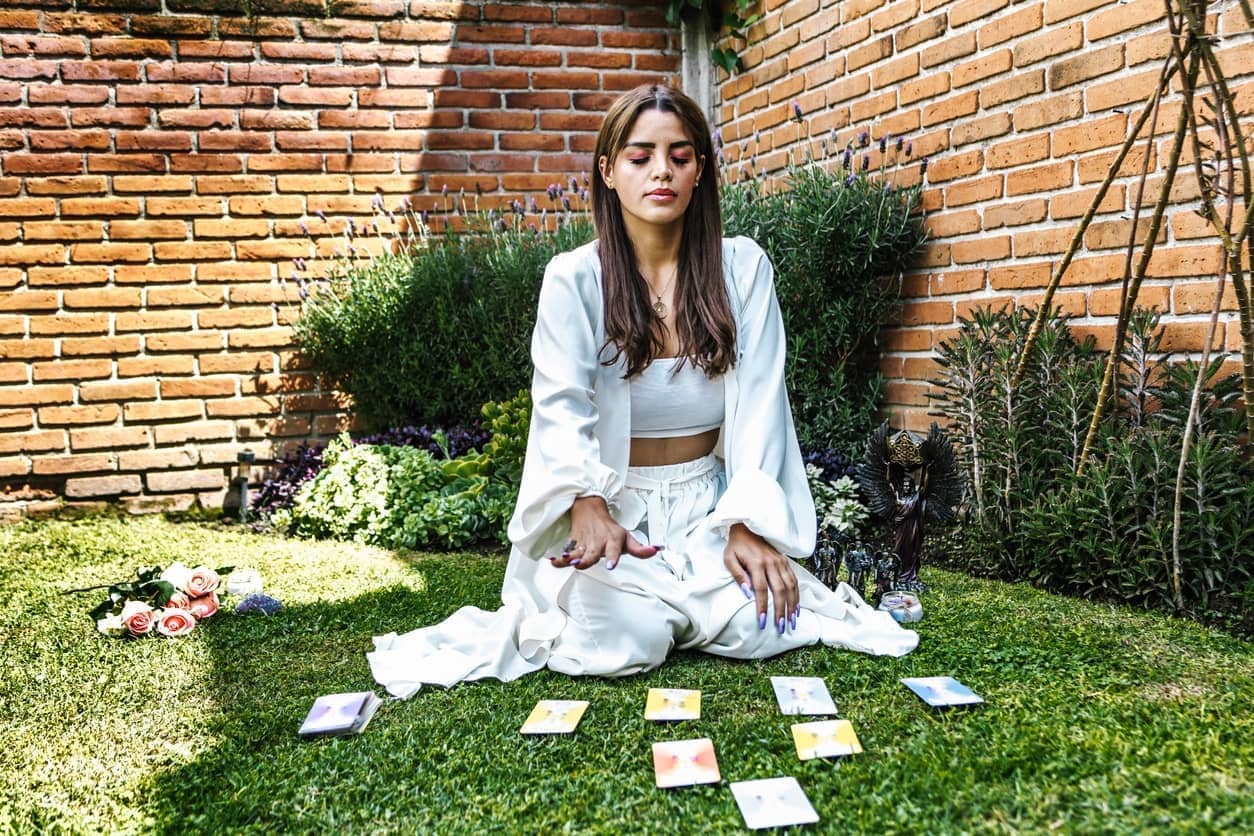Halloween might be over, but Witching Hour has accelerated on TikTok. #WitchTok (or Witch TikTok) is the viral take on spirituality – think Paganism, psychics, and seances in 60 second videos. The hashtag #WitchTok currently has over 20.7 billion views on the video app. In comparison, #Kardashian only has 6.4 billion, and #LoveIsland clocks up a mere 4.9 billion.
As an enthusiastic TikTok user, I started liking WitchTok videos during lockdown. I found myself drawn in by beautiful witches with their crystals and soft-spoken voices. Influencer branding has inevitably pounced on this spiritual trend; the creators of this content practice both magic and sales, and while I can’t speak for the former, the latter is extremely effective. The gentle marketing worked on me – I bought Tarot cards and incense and celebrated the Summer Solstice this year in the most mystical way I could. Big brands have recently caught on. A browse in my local Urban Outfitters (an American clothing store import marketed at Gen Z) reveals card decks, books on witching and healing crystals covering the lifestyle tables.
While the origins are English, Wicca really took off when it spread to the United States and collided with 1960s counterculture.
None of this is new – as anyone who has been to Stonehenge at Midsummer would know. WitchTok is the 2021 update on the psychic listings in early-2000s teen magazines, fortune tellers at funfairs, and crystal shops on Glastonbury High Street. Some witching veterans would roll their eyes at this being called a fad – at the last census, 56,620 people identified their religion as Pagan, and 1,766 as Wicca. While the idea of witchcraft has been around for millennia, the type practiced on TikTok is mostly based on Wicca, a modern Pagan religion dating from the 1950s. Wicca, developed by a retired English civil servant named Gerald Gardner, is often described as an invented tradition. Gardner spun a historical narrative around the new religion, and most of the practices are inspired by European witchcraft, dating to the 15th Century. While the origins are English, Wicca really took off when it spread to the United States and collided with 1960s counterculture.
Mainstream religion is on the downturn, especially among the young: a 2018 British Social Attitudes survey found that only 1 per cent of respondents aged 18-24 described themselves as Anglican, compared to 33 per cent of over-75s, and an increasing proportion of young people have moved away from the religion they were brought up in. And yet a survey by Savanta ComRes found that young people are more likely to pray than the over 55s, with over 51 per cent saying they prayed regularly. There is clearly a spiritual appetite amongst the young and it is finding its expression in unusual online outlets.
Traditionalists can scoff but witchcraft is a way for young people to try and create a sense of control amidst the chaos – when the trend first emerged last year, there were an abundance of healing spells, spells for safety, and manifesting better times.
In fact, witchcraft practice running side by side with pandemics isn’t new either: mass witch-hysteria emerged in 17th Century America after a smallpox epidemic in the New World. It’s now believed that the Salem Witch Trials followed a local outbreak of Rye Ergot, a hallucinogenic fungus which makes people appear ‘bewitched’.
WitchTokers have also found common cause with the drive for Net Zero; they believe in the power of nature, and encourage viewers to live more organic lives, respect their environment, and not over-consume – though of course, their Etsy shops are only one click away.
TikTok’s various tribes offered an attractive form of community during Covid. Its incredibly sensitive algorithm is quick to pigeonhole you into a specific niche. Friends who were normal university students in February 2020 came out members of some slightly cultish tribe or another: whether that be witches, e-girls or just a bit too obsessed with Taylor Swift.
It’s no surprise that young people have sought solace and distraction online. Witching might not include evensongs or communion but it seems to be tapping into the allure of control in a time of uncertainty.







Comments